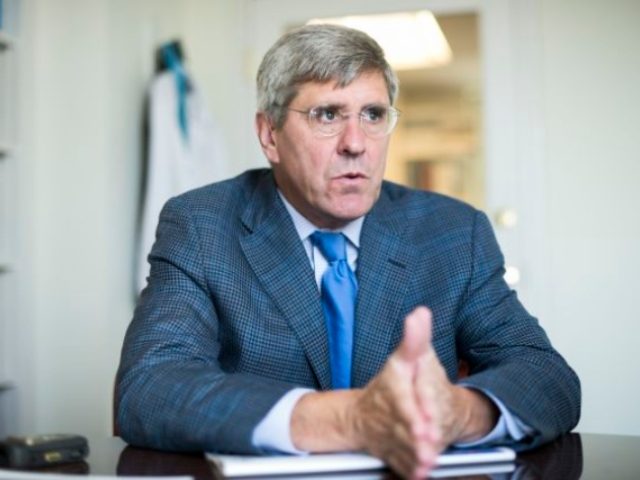Steve Moore, Donald Trump’s pick to fill one of the open slots on the Federal Reserve’s board of governors, has withdrawn from consideration.
“I was honored and grateful that you asked me to serve on the Federal Reserve Board,” Moore said in a statement Thursday. “I am respectfully asking that you withdraw my name from consideration. The unrelenting attacks on my character have become untenable for me and my family and 3 more months of this would be too hard on us.”
The news was broken by President Trump on twitter.
The withdrawal was sudden and unexpected. On Thursday morning, Moore told the Wall Street Journal that he wouldn’t withdraw.
“I’m not pulling out,” Moore said.
Moore has been hounded in recent weeks by mainstream media attacks that focused on a handful of articles and speeches he wrote, some more than decades old, that alleged Moore had “belittled women.” Questioned by journalists about Moore’s writings, several Senate Republicans expressed doubts about the prospects of confirming him.
A recent piece in the Wall Street Journal included excerpts from several of the articles. Its top example was a column from 1994 opposing the Violence Against Women Act sponsored by Joe Biden and others.
“Probably the most objectionable pork in the entire legislation is the $1.8 billion earmarked for Sen. Joe Biden’s ‘Violence Against Women Act.’ That act sets up gender sensitivity programs for judges and police; classifies assaults against women as ‘hate crimes’ or civil rights offenses, and passes out millions of dollars to women’s groups for ‘rape education’ and a smorgasbord of other programs. The act would be more efficient if Congress cut out the federal middleman and simply required every American household to write a $20 check to the radical feminist group of its choice.”
While voting against a bill called the “Violence Against Women Act” may seem shocking in the current “me too” era, thirty-eight Senators voted against the law in 1994, including two Democrats. It was opposed by moderate and conservative GOP Republicans, including Bob Dole, Orin Hatch, John McCain, Charles Grassley, Trent Lott, Dick Lugar, Jesse Helms, Kay Hutchinson, Richard Shelby, and Mark Warner. In the House, 195 Reps voted no.
Other things cited by journalists included a call for banning women refs from men’s college basketball, a 1990s column criticizing co-ed soccer for children, a 2000 column for National Review lamenting his wife’s decision to vote for a Democrat, and comment to a GOP group last year in which Moore said that Republican women were more attractive than Democrat women. Many of the columns were intended to be humorous or sarcastic.
“His writings contain language that sometimes echoes Mr. Trump’s past comments about women on shock radio and on the infamous ‘Access Hollywood’ tape,” the New York Times claimed.
None of the disputed columns touched on issues that would be directly relevant to a job on the board of governors of the Federal Reserve, which neither supervises college athletic refereeing nor evaluates claims of female attractiveness variability by political affiliation. But critics said “they contain controversial statements that could raise questions about Mr. Moore’s actual views toward women,” as the New York Times put it.
Moore has been a severe critic of the Fed and last year called on Fed chair Jerome Powell to resign, a comment he later said he regretted. He has also questioned whether a central bank is necessary.
“I think we should have a discussion in this country about whether we need a Fed,” Moore said in a Journal interview. “Why not just have a rule? A very simple price rule, and just make sure the Fed carries it out, and take as much discretion away from the Fed as possible.”
Those comments, however, were well known when the nomination was first floated months ago and were not responsible for moving GOP Senators against him, according to people familiar with the matter. Instead, it was the allegations about his writings mentioning women that pushed some Republicans into saying they would not support his nomination, those people said.

COMMENTS
Please let us know if you're having issues with commenting.